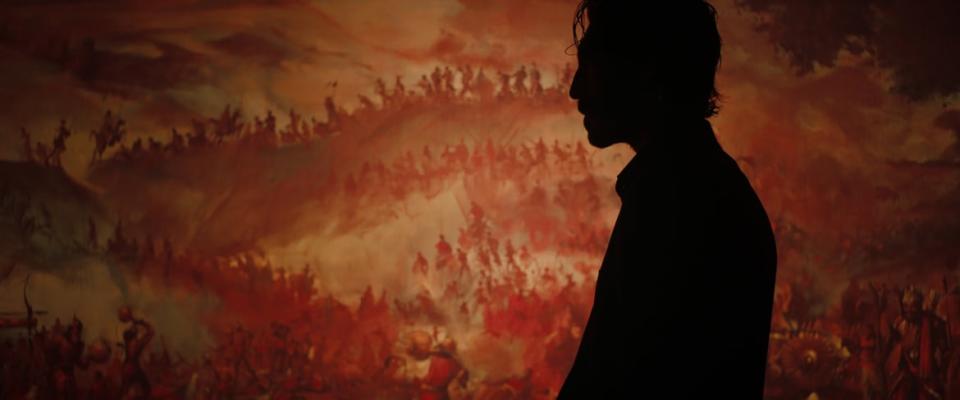Dev Patel’s Directorial Debut ‘Monkey Man’ Can’t Fight Off Its Flaws

- Oops!Something went wrong.Please try again later.
It’s unbelievable that Monkey Man, Dev Patel’s raucous directorial debut which had its world premiere at the SXSW Film Festival March 11, almost skipped the big screen. Not necessarily because it deserves to be there as opposed to plopped onto a streaming platform, but because it’s impossible for any streaming execs to have thought Patel’s film would play best on a television.
The movie had originally been acquired by Netflix, which bought the worldwide rights to distribute the film back in 2021. But Jordan Peele, having a distinct taste and eye for the visual spectacle in his own films, saw a larger vision—specifically dozens of feet larger. Peele knew that Monkey Man belonged on the silver screen and bought the rights to produce it under his company, Monkeypaw. How fitting!
Thank goodness Peele stepped in. Without him, Monkey Man’s scattered merits would be much more difficult to deduce, especially on a smaller screen. While Patel certainly has vision, his first film is wildly scattershot and tonally erratic. Despite its initial suggestion of a John Wick-like scope, Monkey Man quickly falls lopsided as Patel’s story tries to balance the heft of his heart and the immensity of his affection for classic action films. This imbalance makes for a watch that isn’t just dissatisfying, but disappointing—especially considering all of the promise hidden just between the seams.
Samara Weaving Is the (Silent) Scream Queen of SXSW With ‘Azrael’
Comparing Patel’s film to the established John Wick franchise isn’t exactly undeserved, given that insiders at Netflix were doing the same back in 2021. There is a certain amount of narrative overlap between these stories. Both are about men bravely going up against an underworld of lethal corruption. Both star sexy guys seeking revenge for the death of a loved one. And both test how far a movie can stretch itself on superbly choreographed action sequences alone.
As it turns out, it’s not far. Monkey Man’s high-flying combat scenes are the film’s best parts. They’re crafted with an undeniably intelligent eye for battle, and Patel’s fluid direction particularly shines when he’s able to pull from the bevy of references that fill his vast pool of action flick knowledge. But the film feels, at times, too enamored of its own influences, hoping that audiences will be so persuaded by its fast-moving clashes between hero and villains that they forget about the film’s elongated, overworked plot.
Monkey Man follows a young man, played by Patel, who makes a flat sum as an amateur fighter in the depths of India’s slums. Patel’s character wears a monkey mask, partly as a tribute to his late mother, who taught him the legend of Hanuman, an Hindu deity known for his loyalty and bravery. The tale has stuck with the man, after he watched his mother die a grisly death at the hands of a local police chief during a land dispute, during which he and dozens of others were killed and displaced by the politics of India’s sovereign party.

This is firmly a revenge tale, and Monkey Man wastes no time illustrating just how far Patel’s character will go to exact his vengeance. The scenes in which Patel establishes these lengths are initially riveting to watch, but they later become the film’s primary hindrance when the story leans far too hard on the trite, overwrought tentpoles of a hero’s journey. One can see what Patel is aiming for here: something not merely referential, but an outright tribute to the classic action movies he loved—which he was sure to shout out to the SXSW audience before the film started. But Monkey Man suffers when it becomes content with being a divided sum of its parts, instead of a film that adds them all together to create something much larger and truly unique.
To be fair, it’s absolutely fascinating to watch how Patel’s character begins his journey. The film’s first half-hour is a delightful romp, which turns disheartening and stumbles as Patel shoehorns in the backstory to his character’s anger. This origin is so painfully evident that, when the film focuses so hard on it for an extend ed middle portion, it feels positively baffling. That fascinating first hour becomes irrelevant, dropping the action for a self-discovery sequence that is almost entirely useless to the entire story.
What’s frustrating is that Monkey Man firmly positions itself as an outright action film, but there are only two major, extended action sequences. The fighting is kinetic and gorgeously choreographed, with some gasp-worthy moments that play very well in a theater, but not enough to hold the film up when it falters, which is far more often than not. And though Patel tries his absolute best to glue it all together with his solid performance, not even his own conviction can buoy a movie that doesn’t know how to tread water.
Jake Gyllenhaal’s ‘Road House’ Remake Punches Way Above Its Weight
There is, blissfully, one major highlight, which is that these dashed hopes make Monkey Man a seriously interesting film. It would be far less fascinating if it were a perfect first attempt. Instead, the movie is a compelling study of Patel’s burgeoning talents, which are more than evident, despite being muddled so frequently throughout his debut. Though Monkey Man is exasperating, Patel’s work shows heart, love, and promise—something that can’t be said about many other action films. Monkey Man finds novelty in its imperfections, and those blemishes suggest that Patel is only just starting down a road to something genuinely special.
Get the Daily Beast's biggest scoops and scandals delivered right to your inbox. Sign up now.
Stay informed and gain unlimited access to the Daily Beast's unmatched reporting. Subscribe now.

